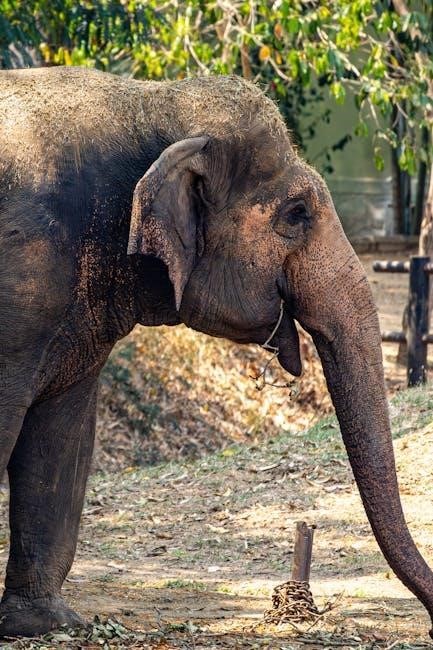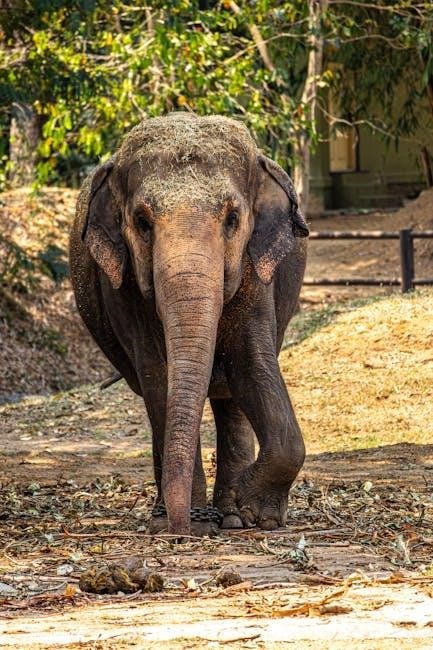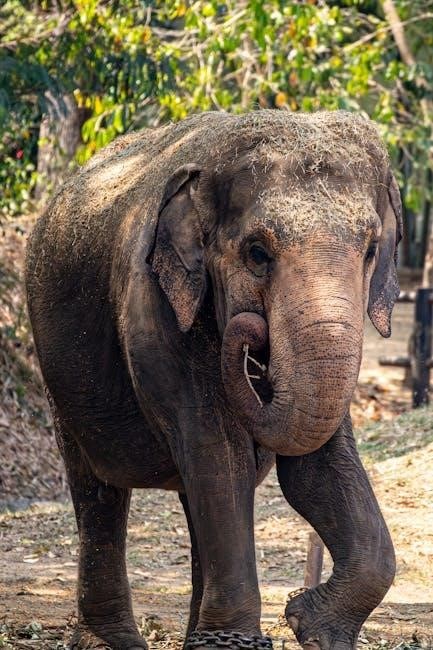shooting an elephant george orwell pdf
“Shooting an Elephant” by George Orwell is a narrative essay reflecting his experiences in colonial Burma‚ exploring themes of imperialism and moral conflict through personal lens.
1.1. Background of George Orwell and the Essay
George Orwell‚ born Eric Arthur Blair in 1903‚ was a British novelist‚ essayist‚ and critic known for his biting satire and political commentary. His essay “Shooting an Elephant‚” published in 1936‚ draws from his experiences as a British police officer in colonial Burma during the 1920s. The essay is deeply autobiographical‚ reflecting Orwell’s growing disillusionment with imperialism and its moral complexities. Written in a clear‚ direct style‚ it critiques the mechanisms of colonial power and the psychological effects on both rulers and ruled. This work is part of Orwell’s broader critique of totalitarianism‚ which would later define his famous novels‚ Animal Farm and Nineteen Eighty-Four.
1.2. Historical Context of Colonial Burma
Colonial Burma‚ under British rule from the late 19th century until the mid-20th century‚ was a land of deep racial and economic divides. The British exploited Burma’s resources‚ fostering resentment among the local population. Orwell’s essay is set in this tense environment‚ where colonial officers like him faced both hostility and moral dilemmas. The period was marked by growing anti-colonial sentiment‚ as Burmese nationalism began to rise. Orwell’s experiences in Moulmein‚ a port city in Lower Burma‚ highlight the complex interplay of power‚ race‚ and identity during this era. This historical backdrop shapes the essay’s exploration of imperialism’s moral and social complexities.
Orwell narrates his morally conflicted experience as a British officer in Burma‚ pressured to shoot an elephant‚ exploring themes of imperialism‚ power‚ and societal expectations.
2.1. The Incident with the Elephant
Orwell recounts an incident where a rogue elephant wreaks havoc in a village‚ prompting him‚ as a British police officer‚ to intervene. The elephant‚ driven mad‚ destroys property and kills a man. Orwell borrows a rifle to stop the elephant‚ but upon finding it calm and harmless‚ he hesitates. However‚ pressured by the gathering crowd‚ he ultimately shoots the elephant‚ justifying his actions to maintain authority. This event highlights the tension between personal morality and societal expectations‚ as Orwell concedes to the demands of colonial perceptions rather than his own judgment.

2.2. The Role of Imperialism and Social Pressure
In “Shooting an Elephant‚” imperialism and social pressure intertwine to drive Orwell’s actions. As a British officer in colonial Burma‚ he feels compelled to assert authority‚ even when morally conflicted. The crowd’s expectation of his role enforces conformity‚ making him shoot the elephant to avoid appearing weak‚ despite recognizing it as a futile act. Imperialism fosters a power dynamic where Orwell must uphold British dominance‚ while societal pressure overrides personal judgment‚ illustrating the destructive impact of such forces on individual morality and decision-making.
Themes Explored in the Essay
The essay delves into themes of imperialism‚ moral conflict‚ and social pressure‚ highlighting the psychological and ethical dilemmas faced under oppressive systems and societal expectations.
3.1. The Dangers of Imperialism
Orwell’s essay vividly portrays the destructive nature of imperialism‚ revealing its psychological and moral impact on both oppressors and the oppressed. The narrative highlights how imperialism dehumanizes not only the colonized but also the colonizers‚ trapping them in a cycle of violence and hypocrisy. The essay illustrates the loss of individual freedom under oppressive systems‚ as the narrator feels compelled to act against his moral judgment to maintain authority. Orwell’s critique extends to the broader societal structures that perpetuate inequality and exploitation‚ offering a poignant commentary on the ethical decay imperialism fosters. The essay remains a powerful indictment of colonialism’s enduring legacy.
3.2. Moral Conflict and Personal Struggle
Orwell’s essay delves deeply into the moral conflict and personal struggle he faced as a British officer in colonial Burma. The narrator is torn between his personal morality and the expectations imposed by his role‚ illustrating the internal battle of adhering to what is right versus conforming to societal pressures. The act of shooting the elephant‚ which he morally opposes‚ highlights the tension between individual conscience and the dictates of authority. This struggle reflects the broader human experience of grappling with ethical dilemmas in the face of external demands. The essay vividly captures the emotional and psychological toll of such conflicts‚ making it a compelling exploration of personal integrity and societal influence.

3.3. The Influence of Social Pressure
In “Shooting an Elephant‚” Orwell vividly portrays how social pressure shapes actions‚ even against personal judgment. The narrator‚ a British officer in colonial Burma‚ feels compelled to shoot the elephant to maintain his authority and avoid appearing weak in front of the native crowd. The presence of onlookers and the fear of ridicule drive his decision‚ highlighting the power of societal expectations. This scenario underscores how individuals often succumb to group mentality‚ prioritizing appearances over morality. Orwell’s experience illustrates the insidious impact of social pressure‚ revealing how it can lead to actions that contradict personal values and perpetuate systemic injustices like imperialism.
Symbolism in “Shooting an Elephant”
The elephant symbolizes imperialism’s destructive force‚ while the rifle represents colonial authority. The crowd embodies societal pressure‚ highlighting how symbols reinforce the essay’s themes of power and conformity.
4.1. The Elephant as a Symbol of Imperialism
In “Shooting an Elephant‚” the elephant serves as a potent symbol of imperialism‚ representing both its power and its destructiveness. Orwell uses the elephant’s uncontrolled rampage to mirror the chaos and devastation caused by colonial rule. The animal’s size and strength evoke the overwhelming might of the British Empire‚ while its eventual death symbolizes the inevitable collapse of imperial dominance. The elephant also embodies the moral corruption inherent in imperialism‚ as Orwell is pressured to shoot it not out of necessity‚ but to maintain his authority. Through this symbolism‚ Orwell critiques the destructive nature of imperialism and its impact on both the colonizer and the colonized.
4.2; The Rifle and Its Significance
The rifle in “Shooting an Elephant” symbolizes the tools of imperialism and the burden of authority. Orwell borrows the rifle to confront the elephant‚ highlighting the weapon’s role in maintaining colonial control. The rifle’s precision and power contrast with the moral ambiguity of the situation‚ emphasizing the destructive potential of imperialistic actions. Its presence also underscores Orwell’s internal conflict‚ as he feels pressured to use it to uphold his image as a British officer. The rifle serves as a tangible representation of the imperial system’s reach and its ability to impose order‚ even when such actions are morally questionable. It embodies the tension between duty and conscience in colonial contexts.
4.3. The Crowd as a Representation of Society
The crowd in “Shooting an Elephant” symbolizes societal pressure and the expectations placed on individuals by their community. As Orwell walks toward the elephant‚ the growing crowd represents the collective gaze of society‚ enforcing conformity and judgment. Their presence compels Orwell to act against his moral judgment‚ highlighting the power of social pressure. The crowd embodies the broader societal forces that drive individuals to conform to expectations‚ even when it conflicts with personal ethics. This dynamic reflects Orwell’s critique of how societal norms and the fear of judgment can lead to morally questionable actions‚ reinforcing the essay’s exploration of human behavior under oppressive systems.

Orwell’s Narrative Style
Orwell employs a first-person narrative‚ creating a personal and reflective tone‚ while his vivid storytelling immerses readers in the moral dilemmas and internal conflicts of colonial life.

5.1. First-Person Narrative and Its Impact
Orwell’s use of a first-person narrative in “Shooting an Elephant” creates a sense of immediacy and intimacy‚ drawing readers into his personal experiences as a police officer in Burma. This narrative style allows Orwell to convey his internal conflicts and moral dilemmas directly‚ making the reader feel his hesitation and the weight of societal expectations. By sharing his thoughts and feelings‚ Orwell humanizes the complexities of colonial rule‚ offering a deeply personal critique of imperialism. The first-person perspective also fosters empathy‚ as readers experience the tension between individual morality and societal pressure alongside the narrator. This approach makes the essay both relatable and impactful‚ grounding its broader themes in Orwell’s lived reality.
5.2. Use of Dramatic Irony and Tension
Orwell masterfully employs dramatic irony and tension in “Shooting an Elephant” to underscore the absurdity of colonial authority and the narrator’s moral struggle. The crowd’s expectation of violence creates tension‚ while the elephant’s calmness introduces irony‚ highlighting the disconnect between perception and reality. Orwell builds suspense as he hesitates‚ knowing the elephant poses no real threat‚ yet feels compelled to act. This tension escalates the narrative‚ culminating in the tragic yet inevitable shooting. The dramatic irony lies in the audience’s awareness of the elephant’s harmlessness‚ contrasting with the narrator’s public image of control. This technique amplifies the critique of imperialism and its pressure to conform‚ even to pointless violence.
The Relevance of the Essay Today
Orwell’s critique of imperialism and societal pressure remains relevant‚ offering insights into modern power dynamics‚ individual morality‚ and the dangers of unchecked authority in contemporary contexts.
6.1. Modern-Day Implications of Imperialism
Orwell’s essay remains a powerful critique of imperialism‚ offering timeless insights into the dangers of power imbalances and systemic oppression. The narrative highlights how imperialism dehumanizes both the oppressor and the oppressed‚ creating a cycle of moral corruption. In today’s world‚ the essay serves as a cautionary tale about the exploitation of resources and cultures‚ echoing contemporary issues like cultural appropriation and political corruption. The moral dilemmas Orwell faces resonate with modern discussions on ethical leadership and the consequences of unchecked authority. His work underscores the importance of questioning systems of power and promoting empathy and understanding in a globalized world.
6.2. The Essay’s Place in Orwell’s Bibliography
“Shooting an Elephant” holds a significant place in George Orwell’s bibliography as a bridge between his early experiences and later literary masterpieces. Written in 1936‚ it reflects his growing critique of imperialism and moral hypocrisy‚ themes that would dominate works like Animal Farm and 1984. The essay is often seen as a precursor to his later dystopian novels‚ showcasing his ability to blend personal narrative with political commentary. Its raw‚ unflinching style laid the groundwork for Orwell’s signature clarity and moral courage in addressing oppressive systems. This essay‚ alongside his other works‚ solidified Orwell’s reputation as a fearless critic of totalitarianism and a champion of intellectual freedom‚ ensuring his enduring relevance in literary and political discourse.